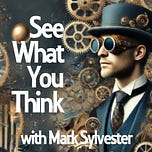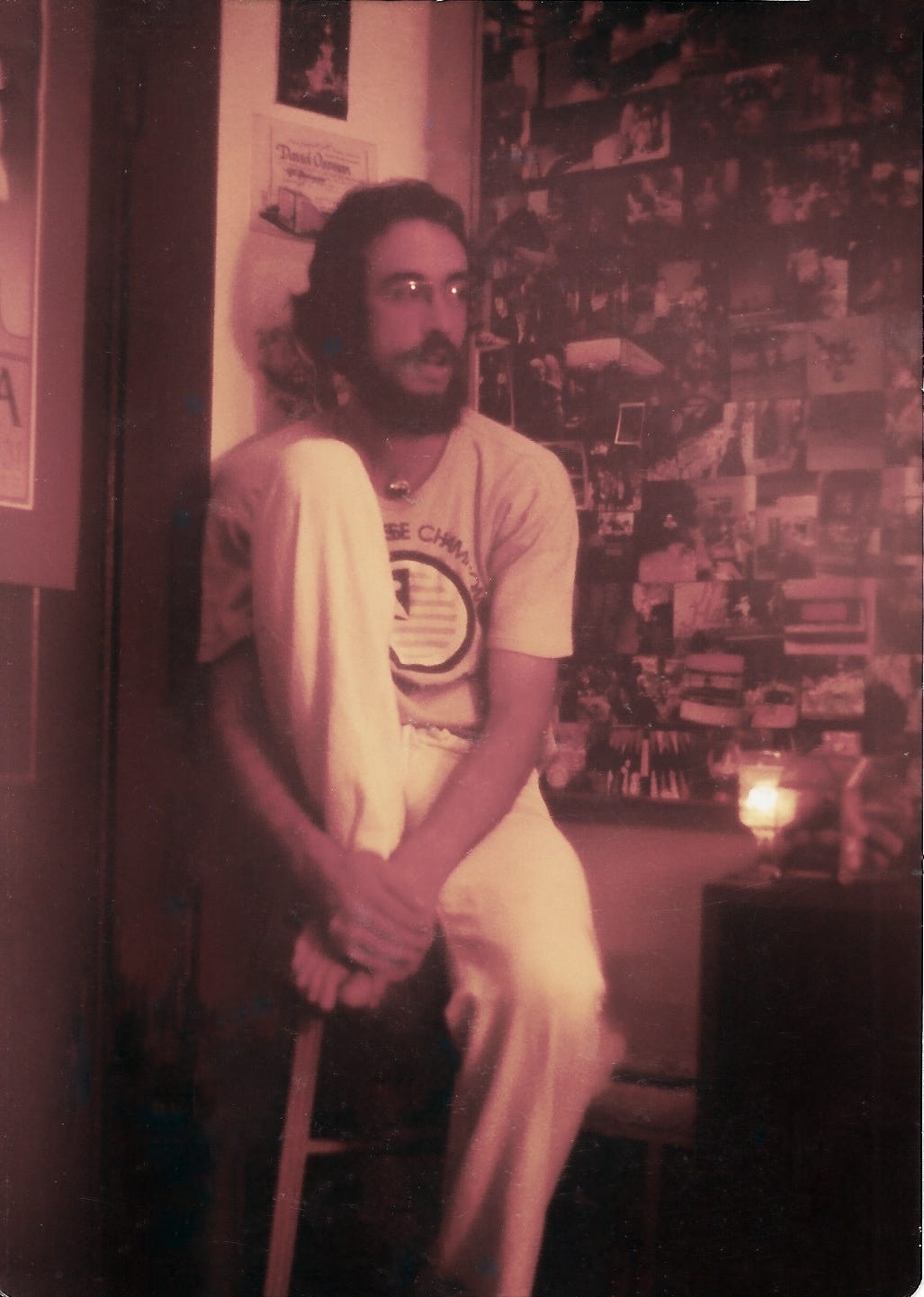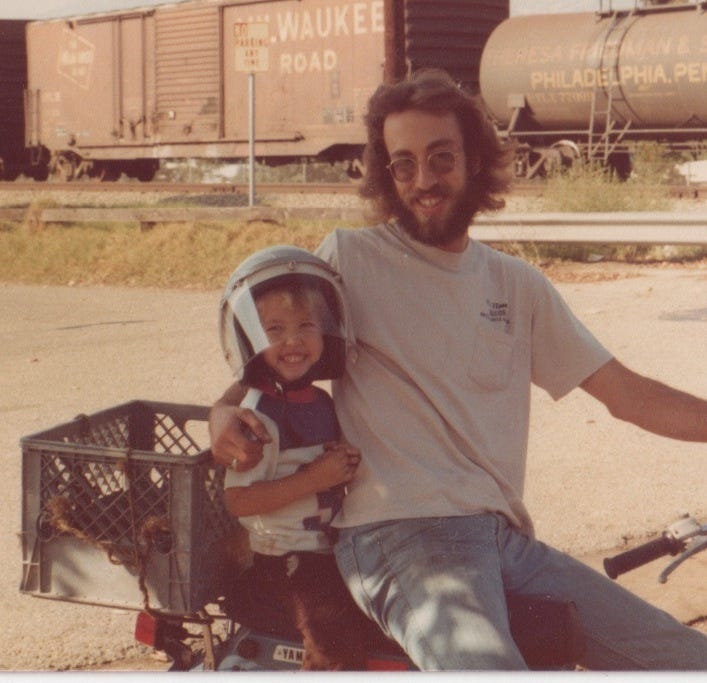There's a strange kind of clarity that shows up in your seventies. Not in the 'I've got it all figured out' way, but more like a long view finally coming into focus. I look back and think: How did I make it through all of that without knowing what I know now? And also: What even is it that I know now
At 21, I found myself divorced with a small son to raise. Everything I thought I knew about adulthood shattered overnight. That moment wasn't just a change of status; it was an existential crisis that forced me to become both a parent and a person simultaneously. I wasn't ready, but who ever is? I wonder: When was your first moment of realizing life wasn't going according to plan?
If my 20s had a soundtrack, it would be the clatter of a kitchen and the swish of a paintbrush. I left home in July 1972, right after high school. My mom was a nurse, and I'd been a latchkey kid before that term even existed. I call it a free-range childhood. That independence would soon be tested in ways I never imagined.
The Chef: Survival and Leadership Under Pressure
My culinary journey began that very summer I left home, at the Gold Rush Plaza Cafe in Auburn. Then, at 19, I moved on to The Red Balloon Coffee Shop, a pivotal place where I met my first wife, who would become the mother of my son. Our relationship developed quickly, and in August, we hurriedly moved to Santa Barbara together. That's when I started at Vista Del Monte, and my professional kitchen career truly took off.
The environment at Vista Del Monte was intense. I picked things up fast because I had to. Hesitation meant getting burned, literally and figuratively. I didn't like being told something twice because in that environment, second chances were rare luxuries.
The stakes kept rising. Each new kitchen, UCSB Student Housing, Westmont College, and Westlake Hospital demanded more from me. I wasn't just cooking; I was becoming responsible for other people's livelihoods. By the time I was drafted into management at the Fontainblu Kitchen due to a chef shortage, I was making decisions that affected dozens of employees, with almost no formal training.
The culmination came when I took over the kitchen at Cate School. They were hemorrhaging money, losing hundreds of thousands. The ultimatum was clear: turn it around or we'll outsource everything. The pressure was immense. Everyone was watching. Within two semesters, I brought it back into the black. That victory wasn't just professional, it was personal validation that I could face a crisis and overcome it.
The Father: Raising a Child While Raising Myself
While my career was unfolding in chaos and triumph, my personal life was undergoing its own transformation. The whirlwind romance that began at The Red Balloon Coffee Shop led to marriage, a child, and then, at 21, divorce. Suddenly, I was a single father, lost in a role I never expected to navigate alone.
In the 1970s, single fathers were anomalies. There were no support groups, no how-to guides, no models to follow. I didn't even know therapy existed as an option. Instead, I found myself desperately reading pop psychology books like I'm OK, You're OK at night, trying to figure out how to heal myself while simultaneously raising a healthy child. The stakes couldn't have been higher; every decision I made would shape another human being's life.
The logistics alone were overwhelming. Finding childcare that accommodated my schedule as a breakfast chef. Figuring out how to be present for a child when work consumed most of my morning hours. Making barely $1,000 a month meant constant financial anxiety; every unexpected expense was a potential catastrophe.
I'll never forget the day I came home from work and opened the mail to find a bill from the electric company. It stated that if I didn't have $20 by the upcoming Friday, they would turn off the power. I had a small boy at home, and we couldn't live in the dark. I called my mom, hoping for help or at least sympathy, but her response was typical: "I know you'll find a way to get it." Click.
That phone call taught me something essential: rely on no one but myself. I did find a way, probably hustled a window painting gig for cash, but the lesson stayed with me. What about you? Was there a moment when you realized you were truly on your own?
The Artist: Finding Identity Beyond Survival
In the midst of this daily struggle for financial and emotional survival, something unexpected emerged: my artistic side. What began as painting teachers' classrooms in high school for spare change became a lifeline to a different version of myself.
When I arrived in Santa Barbara and saw those blank storefront windows during Fiesta and Solstice, something clicked. Here was a canvas where I could create something purely beautiful, purely mine. 'Holidays on Glass' wasn't just a side hustle; I declared that I was more than just a cook, more than just a struggling father.
As a breakfast chef, I'd usually finish my kitchen shifts by 2 PM, and with my son in childcare, I had the rest of the day to paint until sunset. This schedule was a blessing, as it allowed me to paint during the day and spend time with my son at night. It was still physically demanding, pushing myself beyond normal limits, but it fed something essential in me that the other parts of my life couldn't touch.
The breakthrough moment came when I was featured on local TV and in the newspaper. Suddenly, I wasn't just the guy making ends meet; I was an artist, a creator, someone with a unique vision. That recognition didn't pay the bills much better, but it changed how I saw myself. It was the first time I felt like I might be more than just a survivor. I wonder if you've had a similar moment of recognition, a time when someone else's validation helped you see yourself in a different light?
The Integration: What I Was Really Learning
Looking back now, I see that these three worlds, chef, father, and artist, weren't just parallel tracks. They were teaching me different languages with the same fundamental lessons:
People Skills: In the kitchen, I learned that leadership isn't about having all the answers; it's about creating an environment where problems get solved. With my son, I learned that listening matters more than instructing. With my art clients, I learned how to translate someone else's vision through my own hands.
Emotional Skills: The pressure cooker of the kitchen taught me crisis management. Fatherhood taught me patience. Art taught me to express what I couldn't say in words. Together, they forced an emotional resilience I couldn't have developed any other way.
Practical Skills: By necessity, I mastered budgeting when every dollar mattered, inventory when waste meant going hungry, and multi-tasking when there weren't enough hours in the day.
Relationship Skills: This was my greatest struggle. I've been married four times, each relationship teaching me hard lessons about myself. But my current marriage is approaching 20 years because of what those earlier failures taught me.
Lifelong Learning: Even amid chaos, I found myself drawn to adult education classes in Santa Barbara, encompassing subjects such as cooking, art, writing, and psychology. They weren't luxuries; they were lifelines to a future self I couldn't yet envision.
I wonder which of these skill categories resonates most with you? Which ones did you develop early, and which have been a lifelong challenge?
The Redemption: What It All Means Now
Today, I engage in a reflection practice that I learned from a Green Beret: the Three W's - What Went Well, What Went Wrong, and What Needs Work. Had I discovered this structured approach to learning from experience earlier, perhaps some of my hardest lessons would have come more easily.
It took me decades to recognize these chaotic experiences as a deliberate form of education. Now that I see the pattern, I can't unsee it. I'm left wondering: how many young people are currently experiencing their own version of my twenties, unaware that they're laying the foundation for who they will become?
This is why I mentor. When a young person stands before me, uncertain and overwhelmed, I see my younger self. I teach them how to stand strong, literally anchoring their feet and driving their energy into the ground to become an immovable force. I learned this martial arts technique in my 50s, but its wisdom could have saved me countless falls in my 20s.
I share this wisdom while gazing intently into their eyes, ensuring they know I see them, truly see them, in a way I wish someone had seen me when I was struggling to make ends meet with not even $20 to my name.
So now I ask: Do we have a responsibility to illuminate this hidden curriculum for the next generation? Do we offer what no one offered us? Or do we remain silent, believing it's not our place?
I'm still finding my way toward that answer. But I know this: The education between the lines, the one we gain while we're busy surviving, matters as much as any formal learning. Sometimes, it's the skills we acquire along the way, in the heat of necessity, that truly define who we are.
This is just the beginning of a journey through the decades of my life. Over the next several months, I'll explore what each decade taught me, from my turbulent twenties through the transformative thirties, the ambitious forties, the reflective fifties, and beyond. I hope you'll join me for these conversations about the skills that shape us across a lifetime.
Your Turn: A Call to Reflection
I'd love to hear about the skills that shaped your decades. What did your twenties teach you that you didn't fully appreciate until later? What wisdom would you pass on to someone just starting out? Please share your thoughts in the comments below, or send me a message with your own story of learning between the lines.
And if you know someone navigating their chaotic twenties right now, someone trying to make sense of their unexpected education, perhaps share this episode with them. Sometimes, knowing that others have walked a similar path makes the journey a little less lonely.
Until next time, I'm Mark Sylvester, and this has been See What You Think."
Note: Here’s a Deep Dive I did on NotebookLM if you’d like to hear an interview about this article. I love how these two sound like they’ve know me for years.













Share this post